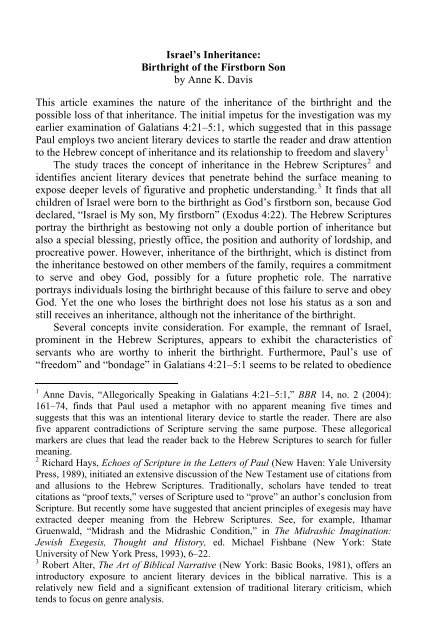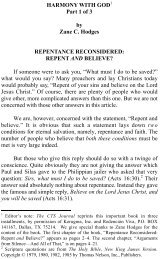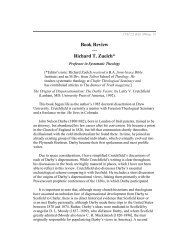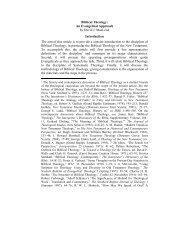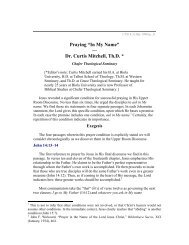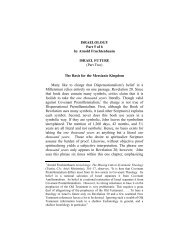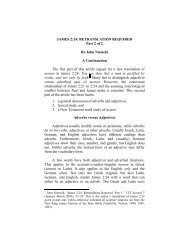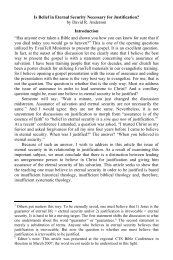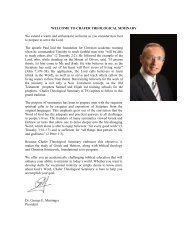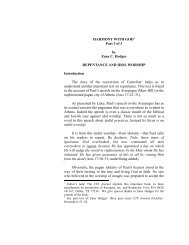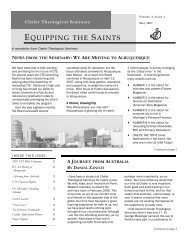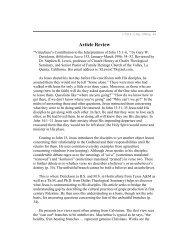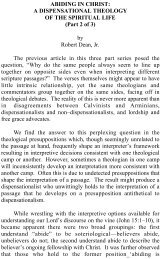Israel's Inheritance: Birthright of the Firstborn Son - Chafer ...
Israel's Inheritance: Birthright of the Firstborn Son - Chafer ...
Israel's Inheritance: Birthright of the Firstborn Son - Chafer ...
You also want an ePaper? Increase the reach of your titles
YUMPU automatically turns print PDFs into web optimized ePapers that Google loves.
Israel’s <strong>Inheritance</strong>:<br />
<strong>Birthright</strong> <strong>of</strong> <strong>the</strong> <strong>Firstborn</strong> <strong>Son</strong><br />
by Anne K. Davis<br />
This article examines <strong>the</strong> nature <strong>of</strong> <strong>the</strong> inheritance <strong>of</strong> <strong>the</strong> birthright and <strong>the</strong><br />
possible loss <strong>of</strong> that inheritance. The initial impetus for <strong>the</strong> investigation was my<br />
earlier examination <strong>of</strong> Galatians 4:21–5:1, which suggested that in this passage<br />
Paul employs two ancient literary devices to startle <strong>the</strong> reader and draw attention<br />
to <strong>the</strong> Hebrew concept <strong>of</strong> inheritance and its relationship to freedom and slavery 1<br />
The study traces <strong>the</strong> concept <strong>of</strong> inheritance in <strong>the</strong> Hebrew Scriptures 2 and<br />
identifies ancient literary devices that penetrate behind <strong>the</strong> surface meaning to<br />
expose deeper levels <strong>of</strong> figurative and prophetic understanding. 3 It finds that all<br />
children <strong>of</strong> Israel were born to <strong>the</strong> birthright as God’s firstborn son, because God<br />
declared, “Israel is My son, My firstborn” (Exodus 4:22). The Hebrew Scriptures<br />
portray <strong>the</strong> birthright as bestowing not only a double portion <strong>of</strong> inheritance but<br />
also a special blessing, priestly <strong>of</strong>fice, <strong>the</strong> position and authority <strong>of</strong> lordship, and<br />
procreative power. However, inheritance <strong>of</strong> <strong>the</strong> birthright, which is distinct from<br />
<strong>the</strong> inheritance bestowed on o<strong>the</strong>r members <strong>of</strong> <strong>the</strong> family, requires a commitment<br />
to serve and obey God, possibly for a future prophetic role. The narrative<br />
portrays individuals losing <strong>the</strong> birthright because <strong>of</strong> this failure to serve and obey<br />
God. Yet <strong>the</strong> one who loses <strong>the</strong> birthright does not lose his status as a son and<br />
still receives an inheritance, although not <strong>the</strong> inheritance <strong>of</strong> <strong>the</strong> birthright.<br />
Several concepts invite consideration. For example, <strong>the</strong> remnant <strong>of</strong> Israel,<br />
prominent in <strong>the</strong> Hebrew Scriptures, appears to exhibit <strong>the</strong> characteristics <strong>of</strong><br />
servants who are worthy to inherit <strong>the</strong> birthright. Fur<strong>the</strong>rmore, Paul’s use <strong>of</strong><br />
“freedom” and “bondage” in Galatians 4:21–5:1 seems to be related to obedience<br />
1 Anne Davis, “Allegorically Speaking in Galatians 4:21–5:1,” BBR 14, no. 2 (2004):<br />
161–74, finds that Paul used a metaphor with no apparent meaning five times and<br />
suggests that this was an intentional literary device to startle <strong>the</strong> reader. There are also<br />
five apparent contradictions <strong>of</strong> Scripture serving <strong>the</strong> same purpose. These allegorical<br />
markers are clues that lead <strong>the</strong> reader back to <strong>the</strong> Hebrew Scriptures to search for fuller<br />
meaning.<br />
2 Richard Hays, Echoes <strong>of</strong> Scripture in <strong>the</strong> Letters <strong>of</strong> Paul (New Haven: Yale University<br />
Press, 1989), initiated an extensive discussion <strong>of</strong> <strong>the</strong> New Testament use <strong>of</strong> citations from<br />
and allusions to <strong>the</strong> Hebrew Scriptures. Traditionally, scholars have tended to treat<br />
citations as “pro<strong>of</strong> texts,” verses <strong>of</strong> Scripture used to “prove” an author’s conclusion from<br />
Scripture. But recently some have suggested that ancient principles <strong>of</strong> exegesis may have<br />
extracted deeper meaning from <strong>the</strong> Hebrew Scriptures. See, for example, Ithamar<br />
Gruenwald, “Midrash and <strong>the</strong> Midrashic Condition,” in The Midrashic Imagination:<br />
Jewish Exegesis, Thought and History, ed. Michael Fishbane (New York: State<br />
University <strong>of</strong> New York Press, 1993), 6–22.<br />
3 Robert Alter, The Art <strong>of</strong> Biblical Narrative (New York: Basic Books, 1981), <strong>of</strong>fers an<br />
introductory exposure to ancient literary devices in <strong>the</strong> biblical narrative. This is a<br />
relatively new field and a significant extension <strong>of</strong> traditional literary criticism, which<br />
tends to focus on genre analysis.
80 CTS Journal 13 (Spring 2008)<br />
and disobedience, and thus to <strong>the</strong> inheritance <strong>of</strong> <strong>the</strong> birthright. The study<br />
provokes o<strong>the</strong>r stimulating questions. What is <strong>the</strong> nature <strong>of</strong> <strong>the</strong> inheritance <strong>of</strong><br />
those sons who will not inherit <strong>the</strong> birthright, and what is <strong>the</strong> relationship <strong>of</strong> <strong>the</strong><br />
church to <strong>the</strong> inheritance <strong>of</strong> <strong>the</strong> birthright? The goal <strong>of</strong> <strong>the</strong> current study is to<br />
prompt fur<strong>the</strong>r discussion on <strong>the</strong> concept <strong>of</strong> inheritance in Scripture by<br />
suggesting that all <strong>the</strong> children <strong>of</strong> Israel have been born to <strong>the</strong> birthright, but<br />
individuals can lose this inheritance.<br />
“Israel Is My <strong>Firstborn</strong> <strong>Son</strong>”<br />
In <strong>the</strong> Exodus narrative, before <strong>the</strong> final devastating plague, in which all <strong>the</strong><br />
firstborn sons <strong>of</strong> Egypt died, God instructed Moses, “Then you shall say to<br />
Pharaoh, ‘Thus says <strong>the</strong> Lord, “Israel is My son, My first-born. So I said to you,<br />
‘Let My son go, that he may serve Me’; but you have refused to let him go.<br />
Behold, I will kill your son, your first-born’” (Exodus 4:22–23).<br />
The passage stimulates an important question: does Israel refer here to Jacob,<br />
whose name God changed to Israel, or does it refer to <strong>the</strong> children <strong>of</strong> Israel? This<br />
study seeks to demonstrate that Israel, whom God has called his firstborn son, in<br />
this passage refers to all <strong>the</strong> children <strong>of</strong> Israel.<br />
Jewish interpretation since Rashi (born in A.D. 1040) has typically held that<br />
“firstborn son” in Exodus 4:22–23 is “an expression <strong>of</strong> greatness” and its deeper<br />
spiritual meaning is Jacob, whose name God changed to Israel. Thus, Rashi<br />
understands “Israel my firstborn son” as God honoring Jacob with <strong>the</strong> birthright<br />
to which Esau had been born. 4 However, Bonchak observes, “Ironically, Rashi’s<br />
midrashic explanation [Jacob is God’s firstborn son, who is entitled to inherit <strong>the</strong><br />
birthright] takes <strong>the</strong> word ‘firstborn’ literally, while his p’shat explanation [that<br />
is, <strong>the</strong> simple meaning, an expression <strong>of</strong> greatness] takes <strong>the</strong> word<br />
allegorically.” 5 Rashi’s inconsistency invites fur<strong>the</strong>r consideration, especially<br />
since Jewish commentary earlier than Rashi acknowledged <strong>the</strong> simple meaning to<br />
be <strong>the</strong> nation <strong>of</strong> Israel, meaning all <strong>the</strong> people <strong>of</strong> Israel. 6<br />
That God refers to <strong>the</strong> children <strong>of</strong> Israel as “My firstborn son” finds support<br />
within <strong>the</strong> biblical text. For example, in <strong>the</strong> Exodus narrative God told Pharaoh,<br />
“I will kill your firstborn son” (Exodus 4:23). In <strong>the</strong> context, “son” means more<br />
than Pharaoh’s son because all <strong>the</strong> firstborn <strong>of</strong> Egypt, both people and animals,<br />
died in <strong>the</strong> last plague. We should also observe that <strong>the</strong> narrative contrasts <strong>the</strong><br />
firstborn son <strong>of</strong> Pharaoh (implying many) with <strong>the</strong> firstborn son <strong>of</strong> God, namely<br />
Israel, which suggests many ra<strong>the</strong>r than a single son.<br />
A parallel also helps clarify this figurative meaning. Following God’s<br />
declaration, “Israel is my firstborn son,” <strong>the</strong> text continues, “I said to you, Let my<br />
son go that he may worship me.” The “son” is <strong>the</strong> people <strong>of</strong> Israel. The narrative<br />
4 Rabbi Yisrael Isser Zvi Herczeg, ed., Rashi: Commentary on <strong>the</strong> Torah, 4th ed. vol. 2<br />
(New York: Mesorah, 1999), 38.<br />
5 Avigdor Bonchek, What’s Bo<strong>the</strong>ring Rashi? A Guide to In-Depth Analysis <strong>of</strong> His Torah<br />
Commentary: Shemos, vol. 2 (Jerusalem: Feldheim, 1999), 38.<br />
6 b. Seder Mo’ed 89b; b. Seder Nez. 3a.
Israel’s <strong>Inheritance</strong> 81<br />
continues with a shift from singular (“son”/“he”) to plural (“people”). After<br />
Exodus 4:22–23, God repeatedly said, “Let my people go so <strong>the</strong>y may worship<br />
me” (Exodus 7:16; 8:1, 20; 9:1, 13; italics added for emphasis in this and <strong>the</strong><br />
following quotations). In o<strong>the</strong>r passages <strong>the</strong> Lord commands, “Let <strong>the</strong> people go”<br />
(Exodus 7:14; 9:17), and three times <strong>the</strong> narrative identifies <strong>the</strong> people as <strong>the</strong><br />
Israelites (Exodus 6:11; 7:2; 9:35). Never again, after Exodus 4:23, did God say,<br />
“Let my son go so he may worship me.” Thus, <strong>the</strong> Hebrew text conveys <strong>the</strong> idea<br />
that “my son” and “my people” are equivalent in meaning.<br />
Therefore, in <strong>the</strong> context <strong>of</strong> <strong>the</strong> Exodus narrative, “Israel” in Exodus 4:22<br />
refers not exclusively to Jacob <strong>the</strong> individual. 7 According to <strong>the</strong> biblical text (and<br />
found in Jewish writings earlier than Rashi), “Israel” in Exodus 4:22 means all<br />
<strong>the</strong> children <strong>of</strong> Israel. God declared all Israelites to be his firstborn son.<br />
The <strong>Birthright</strong>: Double Portion <strong>of</strong> <strong>the</strong> <strong>Inheritance</strong><br />
Since <strong>the</strong> Exodus account portrays all <strong>the</strong> children <strong>of</strong> Israel as having been born<br />
to <strong>the</strong> birthright, we must now ask, how does <strong>the</strong> Hebrew narrative depict <strong>the</strong><br />
nature <strong>of</strong> that inheritance? In particular, why did certain individuals lose <strong>the</strong><br />
inheritance <strong>of</strong> <strong>the</strong> birthright?<br />
The birthright belonged to <strong>the</strong> firstborn son simply by position <strong>of</strong> his birth.<br />
For example, in Genesis 43:33, <strong>the</strong> bro<strong>the</strong>rs <strong>of</strong> Joseph sat before him from <strong>the</strong><br />
eldest to <strong>the</strong> youngest, with <strong>the</strong> eldest described as “<strong>the</strong> firstborn according to his<br />
birthright.” Fur<strong>the</strong>rmore, in <strong>the</strong> case <strong>of</strong> twins, <strong>the</strong> first to emerge from his<br />
mo<strong>the</strong>r’s womb was <strong>the</strong> firstborn. This is evident with Esau (Genesis 25:24–26),<br />
and later with Zerah, <strong>the</strong> first <strong>of</strong> <strong>the</strong> twins born to Judah and Tamar (Genesis<br />
38:27–30; cf. 46:12).<br />
The birthright entitled <strong>the</strong> firstborn to inherit a greater share <strong>of</strong> his fa<strong>the</strong>r’s<br />
land and possessions than <strong>the</strong> remaining heirs. The most common understanding<br />
<strong>of</strong> this greater part in <strong>the</strong> Jewish literature is a double portion, which is twice <strong>the</strong><br />
amount given to each <strong>of</strong> <strong>the</strong> o<strong>the</strong>r sons. 8 Some <strong>the</strong>ologians have criticized this<br />
interpretation <strong>of</strong> a double portion. 9 However, for <strong>the</strong> purpose <strong>of</strong> this study, we<br />
will adhere to this view. Not only is it <strong>the</strong> most common interpretation in <strong>the</strong><br />
Jewish literature, but Davies’ extensive examination <strong>of</strong> Babylonian and Assyrian<br />
records suggests that <strong>the</strong> firstborn received an amount larger than that <strong>of</strong> his<br />
bro<strong>the</strong>rs; <strong>of</strong>ten <strong>the</strong> records state that this amount is a double portion. 10 As this<br />
7 The “individual” view characterizes some Jewish tradition, which <strong>the</strong>n supposes a<br />
spiritual meaning, i.e., <strong>the</strong> “greatness <strong>of</strong> Jacob.”<br />
8 Rabbi Adin Steinsaltz, A Reference Guide to <strong>the</strong> Steinsaltz Edition <strong>of</strong> <strong>the</strong> Talmud, trans.<br />
Rabbi Israel V. Berman (New York: Random, 1989), 170; Louis Ginzberg, Legends <strong>of</strong><br />
<strong>the</strong> Jews, vol. 3 (Philadelphia: Jewish Publication Society, 1966), 211.<br />
9 For example, Hiers notes that this notion <strong>of</strong> a double portion depends largely on Deut.<br />
21:15–17, which contemplates only two sons. Richard H. Hiers, “Transfer <strong>of</strong> Property by<br />
<strong>Inheritance</strong> and Bequest in Biblical Law and Tradition,” Journal <strong>of</strong> Law and Religion 10,<br />
no. 1 (1993–94): 143.<br />
10 Eryl W. Davies, “The <strong>Inheritance</strong> <strong>of</strong> <strong>the</strong> first-born in Israel and <strong>the</strong> Ancient Near East,”<br />
JSS 38, no. 2 (1993): 175–91. Davies has searched in documents <strong>of</strong> ancient Near Eastern
82 CTS Journal 13 (Spring 2008)<br />
study will demonstrate, <strong>the</strong> greater portion <strong>of</strong> inheritance assisted <strong>the</strong> son with<br />
<strong>the</strong> birthright to perform his responsibility <strong>of</strong> leadership.<br />
Redemption <strong>of</strong> <strong>the</strong> <strong>Firstborn</strong> <strong>Son</strong><br />
Although <strong>the</strong> concept <strong>of</strong> <strong>the</strong> birthright in Scripture is similar in many ways to<br />
legal practices affecting firstborn sons in <strong>the</strong> surrounding cultures, <strong>the</strong> Hebrew<br />
Bible develops one aspect <strong>of</strong> <strong>the</strong> inheritance that is different from those <strong>of</strong><br />
Israel’s neighbors. It originates in <strong>the</strong> exodus event. The Hebrew text highlights<br />
God’s rescue <strong>of</strong> <strong>the</strong> children <strong>of</strong> Israel, His firstborn son, from death and<br />
destruction that fell upon all <strong>the</strong> o<strong>the</strong>r firstborn in Egypt, both people and<br />
animals. 11<br />
The Hebrew narrative fur<strong>the</strong>r develops <strong>the</strong> importance <strong>of</strong> <strong>the</strong> firstborn in<br />
three ways. First, <strong>the</strong> text notes <strong>the</strong> special status <strong>of</strong> all firstborn sons by<br />
consecration, which sets apart <strong>the</strong> firstborn as sacred and holy. Sanctification <strong>of</strong><br />
firstborn animals was for <strong>the</strong> purpose <strong>of</strong> sacrifice. We will see that sanctification<br />
<strong>of</strong> <strong>the</strong> firstborn children <strong>of</strong> Israel was for service, which is a living sacrifice.<br />
“Consecrate to Me all <strong>the</strong> first-born, <strong>the</strong> first <strong>of</strong>fspring <strong>of</strong> every womb among <strong>the</strong><br />
sons <strong>of</strong> Israel, both <strong>of</strong> man and beast; it belongs to Me” (Exodus 13:2). “The<br />
first-born <strong>of</strong> an ox or <strong>the</strong> first-born <strong>of</strong> a sheep or <strong>the</strong> first-born <strong>of</strong> a goat, you shall<br />
not redeem; <strong>the</strong>y are holy. You shall sprinkle <strong>the</strong>ir blood on <strong>the</strong> altar and shall<br />
<strong>of</strong>fer up <strong>the</strong>ir fat in smoke as an <strong>of</strong>fering by fire, for a soothing aroma to <strong>the</strong><br />
Lord” (Numbers 18:17).<br />
Second, after God redeemed <strong>the</strong> children <strong>of</strong> Israel from death in Egypt, <strong>the</strong><br />
Hebrew Scriptures portray an ongoing need for redemption <strong>of</strong> <strong>the</strong> firstborn son.<br />
The redemption in Egypt followed <strong>the</strong> placement <strong>of</strong> blood from a sacrificed<br />
animal on <strong>the</strong> doorpost. Continuing redemption also involved animal sacrifice. 12<br />
The text explains this need for continuing redemption.<br />
When in <strong>the</strong> future your child asks you, “What does this mean?” you<br />
shall answer, “By strength <strong>of</strong> hand <strong>the</strong> Lord brought us out <strong>of</strong> Egypt,<br />
from <strong>the</strong> house <strong>of</strong> slavery. When Pharaoh stubbornly refused to let us go,<br />
<strong>the</strong> Lord killed all <strong>the</strong> firstborn in <strong>the</strong> land <strong>of</strong> Egypt, from human<br />
firstborn to <strong>the</strong> firstborn <strong>of</strong> animals. Therefore I sacrifice to <strong>the</strong> Lord<br />
every male that first opens <strong>the</strong> womb, but every firstborn <strong>of</strong> my sons I<br />
redeem.” (Exodus 13:14–15)<br />
cultures for evidence <strong>of</strong> <strong>the</strong> birthright and found that authors treated <strong>the</strong> inheritance <strong>of</strong> <strong>the</strong><br />
firstborn son in a preferential manner. He concludes that <strong>the</strong>re is insufficient data to<br />
determine a definitive ratio but adds that a double portion is evident in <strong>the</strong> texts he<br />
examined. Davies concludes that we should retain <strong>the</strong> traditional understanding <strong>of</strong> a<br />
double portion.<br />
11 Exod. 6:6; cf. Ps. 103:4; Isa. 44:22–23; 63:9.<br />
12 The most noted example in <strong>the</strong> Hebrew Scriptures is <strong>the</strong> substitution <strong>of</strong> a lamb for<br />
Abraham’s near sacrifice <strong>of</strong> Isaac. The New Testament fur<strong>the</strong>r develops this concept <strong>of</strong><br />
substitution. For example, 1 Cor. 5:7 explains that “Christ our Passover also has been<br />
sacrificed.”
Israel’s <strong>Inheritance</strong> 83<br />
Finally, <strong>the</strong> Hebrew narrative explains that <strong>the</strong> firstborn’s consecration<br />
(setting apart as holy) initiates a different kind <strong>of</strong> sacrifice. Paul will later call<br />
this a “living sacrifice,” which he defines as “spiritual service <strong>of</strong> worship”<br />
(Romans 12:1). Paul’s exhortation is compatible with <strong>the</strong> Hebrew Scriptures, for<br />
in <strong>the</strong> Exodus account God repeatedly commands, “Let my people go that <strong>the</strong>y<br />
may worship me.” The Hebrew word that is translated “worship” is avad, from<br />
which <strong>the</strong> word for servant derives (eved). In Hebrew, humble service<br />
acknowledges <strong>the</strong> one true God in proper worship. 13 This study will demonstrate<br />
that <strong>the</strong> relationship between consecration and service to God is characteristic <strong>of</strong><br />
<strong>the</strong> birthright and requires <strong>the</strong> firstborn to be holy as God’s servant and <strong>the</strong><br />
designated leader <strong>of</strong> God’s people.<br />
Thus, <strong>the</strong> Hebrew narrative develops <strong>the</strong> importance <strong>of</strong> <strong>the</strong> firstborn in three<br />
ways. First, it assigns a special holy status to all firstborn sons. Next, it requires<br />
an ongoing need for redemption by substitution <strong>of</strong> sacrificed animals. Finally, it<br />
sets <strong>the</strong> firstborn sons aside for <strong>the</strong> sacrifice <strong>of</strong> worship through service.<br />
The <strong>Birthright</strong>: Benefits and Responsibilities<br />
The firstborn received four benefits and responsibilities in addition to a double<br />
portion <strong>of</strong> his fa<strong>the</strong>r’s estate: a special blessing, <strong>the</strong> <strong>of</strong>fice <strong>of</strong> high priest <strong>of</strong> his<br />
clan or tribe, a position <strong>of</strong> authority and leadership, and procreative vigor. These<br />
attributes are associated with responsibilities <strong>of</strong> leadership.<br />
The special blessing included both current and future benefits. 14 That all <strong>the</strong><br />
o<strong>the</strong>r sons received lesser blessings is apparent from <strong>the</strong> narrative. There are<br />
numerous examples. Esau received a blessing even after he sold his birthright to<br />
Jacob (Genesis 27:39–40). Jacob bestowed Manasseh’s birthright on Ephraim but<br />
gave Manasseh a blessing also (Genesis 48:19). All <strong>the</strong> sons <strong>of</strong> Jacob, including<br />
those who did not inherit <strong>the</strong> birthright, received blessings (Genesis 49:3–27).<br />
Even Reuben, <strong>the</strong> firstborn son <strong>of</strong> Jacob, received a blessing, though his fa<strong>the</strong>r<br />
transferred his birthright to Joseph (1 Chronicles 5:1). 15 However, an additional<br />
special blessing was reserved for <strong>the</strong> son with <strong>the</strong> birthright, as Esau declared<br />
when he cried to his fa<strong>the</strong>r, “He [Jacob] took away my birthright and look, now<br />
he has taken away my blessing” (Genesis 27:36).<br />
In addition to receiving a special blessing and a double portion <strong>of</strong> land and<br />
possessions, <strong>the</strong> firstborn served as <strong>the</strong> high priest <strong>of</strong> his clan. 16 The sages<br />
13 For <strong>the</strong> connection between freedom from slavery in Egypt and serving/worshipping<br />
God, see Exod. 7:16; 8:1, 20; 9:1, 13; 10:3, 7.<br />
14 Jacob Neussner, ed., Dictionary <strong>of</strong> Judaism, ed. Jacob Neussner (Peabody: Hendriksen,<br />
1999), 98.<br />
15 Note, however, distinctive characteristics <strong>of</strong> <strong>the</strong> birthright in Joseph’s blessing (Gen.<br />
49:22–26). Joseph is “set apart from his bro<strong>the</strong>rs” and will be victorious in battle, receive<br />
blessings beyond imagination, and produce abundant <strong>of</strong>fspring. Although <strong>the</strong> Hebrew<br />
text acknowledges Judah’s prophetic status as a leader, it assigns <strong>the</strong> inheritance <strong>of</strong> <strong>the</strong><br />
firstborn’s birthright to Joseph (1 Chr. 5:1–2).<br />
16 The firstborn’s right to <strong>the</strong> priestly <strong>of</strong>fice preceded <strong>the</strong> assignment <strong>of</strong> that role to <strong>the</strong><br />
Levites. We should distinguish <strong>the</strong> later position <strong>of</strong> High Priest in <strong>the</strong> temple from this
84 CTS Journal 13 (Spring 2008)<br />
understood “young men <strong>of</strong> <strong>the</strong> people <strong>of</strong> Israel” to be firstborn sons, leaders <strong>of</strong><br />
<strong>the</strong>ir clans and tribes in Exodus 24:5: “He [Moses] sent young men <strong>of</strong> <strong>the</strong> people<br />
<strong>of</strong> Israel [na’arei b’nei Yisrael], who <strong>of</strong>fered burnt <strong>of</strong>ferings and sacrificed oxen<br />
as <strong>of</strong>ferings <strong>of</strong> well-being to <strong>the</strong> Lord.” The sages concluded that <strong>the</strong> firstborn<br />
sons performed sacrificial services until <strong>the</strong> construction <strong>of</strong> <strong>the</strong> tabernacle and <strong>the</strong><br />
substitution <strong>of</strong> <strong>the</strong> Levites as <strong>the</strong> priestly class. 17<br />
However, firstborn sons apparently lost this right and privilege to <strong>of</strong>fer<br />
sacrifices to <strong>the</strong> Lord because <strong>of</strong> <strong>the</strong> incident with <strong>the</strong> golden calf. Ancient<br />
commentators asked, “Who caused <strong>the</strong> firstborn to forfeit all this glory?” They<br />
gave as an explanation <strong>the</strong> worship <strong>of</strong> <strong>the</strong> golden calf and concluded that <strong>the</strong><br />
firstborn sons were “found in fetters” because <strong>the</strong>y were prohibited from <strong>of</strong>fering<br />
to <strong>the</strong> Lord anything prepared by fire, undoubtedly meaning sacrifices to <strong>the</strong><br />
Lord. 18 Ginzberg comments on <strong>the</strong> firstborn’s loss <strong>of</strong> <strong>the</strong> priestly <strong>of</strong>fice:<br />
“For God elevates no man to an <strong>of</strong>fice unless He has tried him and found<br />
him worthy <strong>of</strong> his calling.” He did not say, “and <strong>the</strong> Levites shall be<br />
Mine,” before He had tried this tribe, and found <strong>the</strong>m worthy. In Egypt<br />
none but <strong>the</strong> tribe <strong>of</strong> Levi observed <strong>the</strong> Torah and clung to <strong>the</strong> token <strong>of</strong><br />
<strong>the</strong> Abrahamic covenant, while <strong>the</strong> o<strong>the</strong>r tribes, abandoning both Torah<br />
and token <strong>of</strong> covenant, like <strong>the</strong> Egyptians, practiced idolatry. In <strong>the</strong><br />
desert, also, it was this tribe alone that did not take part in <strong>the</strong> worship <strong>of</strong><br />
<strong>the</strong> Golden Calf. Justly, <strong>the</strong>refore, did God’s choice fall upon this godly<br />
tribe, who on this day were consecrated as <strong>the</strong> servants <strong>of</strong> God and His<br />
sanctuary. 19<br />
Thus, <strong>the</strong> firstborn sons <strong>of</strong> Israel lost <strong>the</strong>ir priestly position and functions,<br />
and <strong>the</strong> Levites assumed <strong>the</strong> responsibility <strong>of</strong> <strong>of</strong>fering sacrifices to <strong>the</strong> Lord on<br />
behalf <strong>of</strong> o<strong>the</strong>rs (Numbers 3:44–45). Because <strong>the</strong> firstborn sons had lost this<br />
responsibility, <strong>the</strong> Lord instructed that <strong>the</strong> priests perform a ceremony <strong>of</strong><br />
redemption when a firstborn child was thirty days old, which consisted primarily<br />
in <strong>the</strong> payment <strong>of</strong> five shekels to a priest by <strong>the</strong> child’s fa<strong>the</strong>r. 20 This payment<br />
signified redemption from <strong>the</strong> firstborn’s responsibility <strong>of</strong> <strong>the</strong> priestly <strong>of</strong>fice,<br />
which had required him to be holy and consecrated for service to God on behalf<br />
<strong>of</strong> o<strong>the</strong>rs.<br />
earlier period. The earliest priestly responsibility <strong>of</strong> <strong>the</strong> firstborn sons is recognized in <strong>the</strong><br />
Jewish literature and occasionally in non-Jewish literature as well. See, for example,<br />
Num. Rab. 29a; cf. Num. Rab. 14b. See also Ginzberg, Legends, 211; Beitzel, “Right <strong>of</strong><br />
<strong>the</strong> <strong>Firstborn</strong>,” 180.<br />
17 Num. Rab. 29a.<br />
18 Midrash Rabbah, Numbers, 161. The midrash does not explain “anything prepared by<br />
fire,” but <strong>the</strong> priests frequently burned <strong>of</strong>ferings identified as “<strong>of</strong>ferings by fire.” See, for<br />
example, Lev. 1:9, 13; 2:2, 16; 3:3, 9, 11; Num. 15:3, 10; 28:3, 19.<br />
19 Ginzberg, Legends, 211.<br />
20 Num. 3:47; 18:16; cf. Num. Rab. 14b. Many Jews still practice this ceremony <strong>of</strong><br />
redemption today. See Isaac Klein, A Guide to Jewish Religious Practices (NY: Jewish<br />
Theological Seminary, 1979), 431–32.
Israel’s <strong>Inheritance</strong> 85<br />
Ano<strong>the</strong>r aspect <strong>of</strong> <strong>the</strong> firstborn was a position <strong>of</strong> authority and leadership.<br />
During his fa<strong>the</strong>r’s lifetime, <strong>the</strong> firstborn apparently exercised some authority<br />
over his bro<strong>the</strong>rs, as <strong>the</strong> narrative <strong>of</strong> Reuben conveys. 21 Upon <strong>the</strong> death <strong>of</strong> his<br />
fa<strong>the</strong>r, <strong>the</strong> firstborn son became <strong>the</strong> next leader <strong>of</strong> his clan or tribe, which made<br />
his elevation to this authoritative position part <strong>of</strong> his inheritance. Beitzel<br />
explains, “The purpose <strong>of</strong> primogeniture <strong>the</strong>n was <strong>the</strong> systematic and orderly<br />
transference <strong>of</strong> social, legal, and religious authority within <strong>the</strong> family structure.<br />
The firstborn male was made <strong>the</strong> principal heir and was given a sizeable portion<br />
<strong>of</strong> <strong>the</strong> estate because it was he who was to perpetuate <strong>the</strong> family name and<br />
lineage and who was to bear <strong>the</strong> chief burden for <strong>the</strong> continuance and welfare <strong>of</strong><br />
<strong>the</strong> family.” 22<br />
The Hebrew narrative portrays this concept <strong>of</strong> responsibility and lordship.<br />
For example, when Joseph became viceroy <strong>of</strong> Egypt, he fulfilled a prophecy.<br />
Joseph had dreamed that his sheaf <strong>of</strong> grain was standing upright while those <strong>of</strong><br />
his bro<strong>the</strong>rs were bowing down to his sheaf. His bro<strong>the</strong>rs responded with<br />
indignation, “Are you indeed to have dominion over us?” (Genesis 37:5–8).<br />
Ano<strong>the</strong>r example is Jacob, who inherited <strong>the</strong> blessing <strong>of</strong> <strong>the</strong> birthright and<br />
<strong>the</strong> position <strong>of</strong> authority even though he was <strong>the</strong> younger son. This understanding<br />
<strong>of</strong> leadership becomes clear through Isaac’s description to his firstborn son, Esau,<br />
<strong>of</strong> Jacob’s special blessing. “I have already made him your lord, and have given<br />
him all his bro<strong>the</strong>rs as servants” (Genesis 27:37a). Lordship is a position <strong>of</strong><br />
leadership authority. Apparently Esau (or perhaps his descendants, since <strong>the</strong>se<br />
words are prophetic) would become a servant <strong>of</strong> Jacob after Isaac’s death.<br />
Finally, in this position <strong>of</strong> leadership and authority, <strong>the</strong> firstborn son<br />
increased <strong>the</strong> strength <strong>of</strong> his tribe in order to claim his inheritance by conquering<br />
<strong>the</strong> land that <strong>the</strong> Lord had promised to him. 23 Jacob’s blessing <strong>of</strong> Reuben, who<br />
was born to <strong>the</strong> birthright which he subsequently lost, includes this attribute <strong>of</strong><br />
<strong>the</strong> birthright: “my might and <strong>the</strong> first fruits <strong>of</strong> my vigor [ohn]” (Genesis 49:3; cf.<br />
Deuteronomy 21:17). Fohrer notes that ohn conveys primarily strength in<br />
numbers that results from a man’s procreative power. He fur<strong>the</strong>r explains, “The<br />
man with such strength is able to acquire ‘property’ as <strong>the</strong> result or consequence<br />
<strong>of</strong> forceful action.” 24 This strength <strong>of</strong> procreative power for <strong>the</strong> purpose <strong>of</strong><br />
conquest is a meaningful concept in Scripture, apparently related to <strong>the</strong> blessing<br />
21 When <strong>the</strong> o<strong>the</strong>r bro<strong>the</strong>rs wanted to kill Joseph, Reuben’s decision for life was decisive<br />
(Gen. 37:21–22).<br />
22 Beitzel, “Right <strong>of</strong> <strong>the</strong> <strong>Firstborn</strong>,” 180.<br />
23 Yarash is <strong>of</strong>ten translated “inherit.” However, <strong>the</strong> word also conveys <strong>the</strong> concept <strong>of</strong><br />
inheritance by “taking possession” <strong>of</strong> land and “dispossessing” those who live in that<br />
land. Francis Brown et al., eds., Brown-Driver-Briggs Hebrew and English Lexicon<br />
(Peabody: Hendrikson, 1997), 439.<br />
24 Goerg Fohrer, “Tw<strong>of</strong>old aspects <strong>of</strong> Hebrew Words,” in Words and Meanings, ed. P. R.<br />
Ackroyd and B. Lindars (Cambridge: Cambridge University, 1968), 99.
86 CTS Journal 13 (Spring 2008)<br />
<strong>of</strong> abundant seed given to those patriarchs who inherit <strong>the</strong> birthright: Abraham,<br />
Isaac, and Jacob (Genesis 15:5; 26:4; 28:14). 25<br />
To summarize, <strong>the</strong> firstborn son was entitled to his birthright by virtue <strong>of</strong> <strong>the</strong><br />
position <strong>of</strong> his birth, which entitled him to a double portion <strong>of</strong> his fa<strong>the</strong>r’s land<br />
and possessions. The birthright bestowed four additional benefits and<br />
responsibilities. First was a special blessing that was greater than <strong>the</strong> blessings <strong>of</strong><br />
his bro<strong>the</strong>rs. Second was <strong>the</strong> <strong>of</strong>fice <strong>of</strong> high priest to his family, clan, or tribe.<br />
Third was a leadership position <strong>of</strong> authority over his clan. Finally, God endowed<br />
<strong>the</strong> son with <strong>the</strong> birthright with procreative power to streng<strong>the</strong>n his clan or tribe<br />
for <strong>the</strong> purpose <strong>of</strong> conquest. These birthright benefits are attributes <strong>of</strong> leadership.<br />
In <strong>the</strong> prophetic passages, <strong>the</strong> inheritance <strong>of</strong> <strong>the</strong> firstborn seems to point to a<br />
future role <strong>of</strong> leadership service to God and His people.<br />
Loss <strong>of</strong> <strong>the</strong> <strong>Birthright</strong><br />
The possibility that <strong>the</strong> firstborn could lose his birthright, which would <strong>the</strong>n<br />
transfer to ano<strong>the</strong>r son, is a repetitive concept in Scripture. 26 The Hebrew text<br />
records this transfer <strong>of</strong> inheritance throughout <strong>the</strong> patriarchal period, for example,<br />
Ishmael to Isaac; Esau to Jacob; and Reuben to Joseph. 27 The transfer <strong>of</strong><br />
inheritance included all <strong>the</strong> attributes <strong>of</strong> <strong>the</strong> birthright: property, special blessing,<br />
priestly <strong>of</strong>fice, position <strong>of</strong> authority and leadership, and procreative power.<br />
Ishmael was <strong>the</strong> firstborn son <strong>of</strong> Abraham. That he was entitled to an inheritance<br />
is apparent from Sarah’s vehement demand that Abraham disinherit Ishmael:<br />
“The son <strong>of</strong> this slave woman shall not inherit along with my son Isaac” (Genesis<br />
21:10; cf. Galatians 4:30). The text narrates that Abraham “gave all he had to<br />
Isaac” (Genesis 25:5). Thus, Ishmael apparently lost an inheritance to which he<br />
would have been entitled as <strong>the</strong> firstborn.<br />
25 Related to abundant <strong>of</strong>fspring is <strong>the</strong> promise that nations will come from <strong>the</strong> one<br />
receiving <strong>the</strong> birthright (Gen. 17:4–6; 26:4; 35:11). The plural “nations” (goyim) conveys<br />
a great abundance <strong>of</strong> many distinct peoples.<br />
26 Repetition is a well-recognized ancient literary device for emphasis, contrast and<br />
expansion that prompts a deeper understanding.<br />
27 The Hebrew text describes a firstborn’s loss <strong>of</strong> his elevated position even in <strong>the</strong> time<br />
before Abraham. Cain was <strong>the</strong> firstborn son <strong>of</strong> Adam, but God placed him under a curse<br />
for killing his bro<strong>the</strong>r, Abel, and drove him from <strong>the</strong> land. Seth <strong>the</strong>n assumed <strong>the</strong> elevated<br />
position that Cain had lost. Ano<strong>the</strong>r example is Japheth, <strong>the</strong> firstborn son <strong>of</strong> Noah (Gen.<br />
10:21). The text records <strong>the</strong> descendants <strong>of</strong> Japheth first in <strong>the</strong> genealogical list,<br />
indicating his firstborn status (Gen. 10:2). Because Shem ascended to <strong>the</strong> elevated<br />
position normally reserved for <strong>the</strong> firstborn son, <strong>the</strong> order <strong>of</strong> <strong>the</strong> names is inverted in <strong>the</strong><br />
Hebrew narrative to Shem, Ham, and Japheth (Gen. 5:32, 6:10, 9:18, 10:1). Cf. E. W.<br />
Bullinger, ed., The Companion Bible (Grand Rapids: Kregel, 1990), 16 n. 21.<br />
Fur<strong>the</strong>rmore, <strong>the</strong> text identifies Ham as Noah’s youngest son (Gen. 9:24). Yet Ham is<br />
listed before <strong>the</strong> fallen firstborn. It is also possible that Abram was <strong>the</strong> youngest son <strong>of</strong><br />
Terah, and Haran <strong>the</strong> oldest (ibid., 17 n. 27), but <strong>the</strong> narrative is unclear. As for Isaac and<br />
Jacob, <strong>the</strong> narrative is not only clear but also quite detailed.
Israel’s <strong>Inheritance</strong> 87<br />
Esau was <strong>the</strong> firstborn son <strong>of</strong> Isaac (Genesis 25:14–15). However, God’s<br />
prophecy to Rebekah declared, “Two nations are in your womb, and two peoples<br />
born <strong>of</strong> you shall be divided; <strong>the</strong> one shall be stronger than <strong>the</strong> o<strong>the</strong>r, <strong>the</strong> elder<br />
shall serve <strong>the</strong> younger” (Genesis 25:23). It is apparent from <strong>the</strong> narrative that <strong>the</strong><br />
stronger bro<strong>the</strong>r was Jacob, <strong>the</strong> younger <strong>of</strong> <strong>the</strong> two, and he and his descendants<br />
would have authority over Esau and his descendants. The narrative includes a<br />
detailed account <strong>of</strong> Esau, who sold his birthright to his younger twin, Jacob<br />
(Genesis 25:29–34). Esau also lost <strong>the</strong> special blessing reserved for <strong>the</strong> son with<br />
<strong>the</strong> birthright (Genesis 27:36).<br />
From <strong>the</strong> numerous examples <strong>of</strong> younger sons who acquired <strong>the</strong> birthright,<br />
one might conclude that this was <strong>the</strong> norm ra<strong>the</strong>r than <strong>the</strong> exception. Some<br />
scholars suggest that ultimogeniture (inheritance by <strong>the</strong> youngest son) may have<br />
been a customary practice among <strong>the</strong> ancient Israelites. However, de Vaux<br />
dismisses this claim, as does Greenspahn. 28 Moreover, it is important to note that<br />
<strong>the</strong> genealogical lists typically record <strong>the</strong> order <strong>of</strong> <strong>the</strong> sons from <strong>the</strong> eldest<br />
(identified occasionally as <strong>the</strong> firstborn) to <strong>the</strong> youngest. The list <strong>of</strong> Ishmael’s<br />
sons is an example. 29<br />
Even when <strong>the</strong>re were unusual circumstances surrounding his birth, a son<br />
was entitled to his inheritance. The Hebrew text gives two interesting examples.<br />
One was Jephthah, <strong>the</strong> son <strong>of</strong> a harlot. The expectation is that such a son might<br />
not be entitled to inherit, and certainly not to inherit <strong>the</strong> birthright <strong>of</strong> <strong>the</strong> firstborn<br />
son. Thus, Greenspahn notes that <strong>the</strong> expulsion <strong>of</strong> Jephthah from his household<br />
(Judges 11:12) suggests that he was entitled to a part <strong>of</strong> <strong>the</strong> inheritance.<br />
O<strong>the</strong>rwise <strong>the</strong>re would have been no need to expel him. Ano<strong>the</strong>r example is <strong>the</strong><br />
son <strong>of</strong> a slave woman. However, Greenspahn again notes <strong>the</strong> text’s assumption<br />
that Ishmael was entitled to receive some kind <strong>of</strong> inheritance because <strong>of</strong> Sarah’s<br />
desire that Hagar be expelled (Genesis 21:10). 30 Fur<strong>the</strong>rmore, Jacob’s four sons<br />
by <strong>the</strong> slave women, Bilhah and Zilpah (Genesis 35:25–26), inherited equally<br />
with <strong>the</strong> o<strong>the</strong>r sons. Dan and Naphtali, sons <strong>of</strong> Rachel’s maidservant Bilhah, as<br />
well as Gad and Asher, sons <strong>of</strong> Leah’s maidservant Zilpah, not only received<br />
blessings from Jacob (Genesis 49:16–21) but <strong>the</strong>ir descendants also became four<br />
<strong>of</strong> <strong>the</strong> twelve tribes <strong>of</strong> Israel that received an inheritance in <strong>the</strong> Promised Land.<br />
Ishmael Lost <strong>the</strong> <strong>Birthright</strong><br />
Ishmael was <strong>the</strong> son <strong>of</strong> a slave woman, Hagar. The loss <strong>of</strong> his inheritance is<br />
especially interesting because Paul refers to this event in Galatians 4:21–5:1. It is<br />
28 Roland de Vaux, The Early History <strong>of</strong> Israel to <strong>the</strong> Exodus and Covenant <strong>of</strong> Sinai<br />
(London: Darton, Longman & Todd, 1978), 235. Frederick E. Greenspahn,<br />
“Primogeniture in Ancient Israel,” in Go to <strong>the</strong> Land I Will Show You: Studies in Honor<br />
<strong>of</strong> Dwight W. Young, ed. J. E. Coleson and V. H. Mat<strong>the</strong>ws (Winona Lake: Eisenbrauns,<br />
1996), 70.<br />
29 “These are <strong>the</strong> names <strong>of</strong> <strong>the</strong> sons <strong>of</strong> Ishmael, by <strong>the</strong>ir names, in <strong>the</strong> order <strong>of</strong> <strong>the</strong>ir birth”<br />
(Gen. 25:13–15).<br />
30 Greenspahn, “Primogeniture,” 75.
88 CTS Journal 13 (Spring 2008)<br />
clear from <strong>the</strong> narrative that Ishmael did not ultimately receive <strong>the</strong> birthright,<br />
since Abraham “gave all he had to Isaac” (Genesis 25:5). This raises several<br />
questions. Did Ishmael, in fact, even have <strong>the</strong> birthright? If so, why did he lose<br />
it? Did he receive any kind <strong>of</strong> inheritance? Although <strong>the</strong> answers in <strong>the</strong> Hebrew<br />
text may not be conclusive, several aspects <strong>of</strong> <strong>the</strong> narrative shed light on <strong>the</strong>se<br />
questions. Fur<strong>the</strong>rmore, <strong>the</strong> more detailed accounts <strong>of</strong> Esau and Reuben fill in<br />
some <strong>of</strong> <strong>the</strong> gaps.<br />
Ishmael was certainly <strong>the</strong> firstborn son <strong>of</strong> Abraham. As noted earlier, <strong>the</strong><br />
Hebrew text conveys <strong>the</strong> concept that <strong>the</strong> son born first stood to receive <strong>the</strong><br />
birthright. Even though Ishmael was <strong>the</strong> son <strong>of</strong> a slave woman, Hagar, it seems<br />
that he was entitled to an inheritance. By fur<strong>the</strong>r example, <strong>the</strong> sons <strong>of</strong> <strong>the</strong> slave<br />
women, Zilpah, Bilhah, and Keturah were entitled to an inheritance. So<br />
apparently was Jephthah. Sarah’s heated words fur<strong>the</strong>r conveyed an expectation<br />
that Hagar’s son Ishmael would receive an inheritance.<br />
It should be noted that Abraham did not disinherit Ishmael by his own<br />
decision or because Sarah told him to do so. It was only after God instructed him<br />
to follow Sarah’s advice that Abraham expelled his firstborn son. “The matter<br />
was very distressing to Abraham on account <strong>of</strong> his son. But God said to him, ‘Do<br />
not be distressed because <strong>of</strong> <strong>the</strong> boy and because <strong>of</strong> your slave woman; whatever<br />
Sarah tells to you, do as she tells you, for it is through Isaac that <strong>of</strong>fspring will be<br />
named for you. I will make a nation <strong>of</strong> him also, because he is your <strong>of</strong>fspring’”<br />
(Genesis 21:11–13).<br />
One notes a characteristic <strong>of</strong> <strong>the</strong> birthright when God tells Abraham, “It is<br />
through Isaac that <strong>of</strong>fspring will be named for you.” The recipient <strong>of</strong> <strong>the</strong><br />
birthright was responsible for perpetuating <strong>the</strong> family name and lineage and was<br />
“<strong>the</strong> firstfruits” <strong>of</strong> his fa<strong>the</strong>r’s procreative vigor. 31 The text implies that Abraham<br />
expected his <strong>of</strong>fspring to be named through Ishmael until God intervened and<br />
selected Isaac.<br />
Moreover, although <strong>the</strong> text comments that Abraham “gave all he had to<br />
Isaac” (Genesis 25:5), it provides a fur<strong>the</strong>r explanation. “But to <strong>the</strong> sons <strong>of</strong> his<br />
concubines [‘concubines’ is plural, meaning Hagar and Keturah] Abraham gave<br />
gifts, while he was still living, and he sent <strong>the</strong>m away from his son Isaac,<br />
eastward to <strong>the</strong> east country” (Genesis 25:6). Hiers notes <strong>the</strong> distinction between<br />
a bequest that a fa<strong>the</strong>r <strong>of</strong>ten transferred during his lifetime by specific<br />
instructions and an inheritance that a son received upon <strong>the</strong> fa<strong>the</strong>r’s death as<br />
regulated by custom. 32 Ishmael apparently received a bequest from his fa<strong>the</strong>r, as<br />
did <strong>the</strong> sons <strong>of</strong> Keturah. 33<br />
31 In Hebrew, <strong>the</strong> text uses <strong>the</strong> same verbal root for firstborn (b’chor), for firstfruits<br />
(bikkur), and for <strong>the</strong> verbal concept <strong>of</strong> selection (bachar).<br />
32 Hiers, “Transfer,” 122.<br />
33 Davies, “<strong>Inheritance</strong>,” 180. Davies finds evidence in Babylonian records that “<strong>the</strong><br />
fa<strong>the</strong>r retained <strong>the</strong> right during his lifetime <strong>of</strong> making a special provision for a favorite<br />
son by granting him a gift,” which is apparently what Abraham did with Ishmael and <strong>the</strong><br />
sons <strong>of</strong> Keturah.
Israel’s <strong>Inheritance</strong> 89<br />
Abraham continued, never<strong>the</strong>less, to regard Ishmael as his son, for <strong>the</strong><br />
Hebrew text records <strong>the</strong> descendants <strong>of</strong> Ishmael in Abraham’s genealogy<br />
(Genesis 25:12–18). Fur<strong>the</strong>rmore, <strong>the</strong> text narrates that God acknowledged <strong>the</strong><br />
status <strong>of</strong> Ishmael as Abraham’s son when He told Abraham, “I will make a<br />
nation <strong>of</strong> him [Ishmael] also, because he is your <strong>of</strong>fspring” (Genesis 21:13).<br />
Finally, Ishmael must have continued to associate with his bro<strong>the</strong>r after Abraham<br />
cast Hagar out <strong>of</strong> his camp, because both Ishmael and Isaac buried Abraham in<br />
<strong>the</strong> cave <strong>of</strong> Machpelah (Genesis 25:9). 34<br />
It seems clear from <strong>the</strong> narrative that Ishmael, <strong>the</strong> firstborn son <strong>of</strong> Abraham,<br />
lost <strong>the</strong> inheritance to which his birthright entitled him. Logically, <strong>the</strong>n, <strong>the</strong><br />
birthright passed to Isaac, through whom Abraham’s “<strong>of</strong>fspring will be named.”<br />
Carrying <strong>the</strong> name is a concept that suggests <strong>the</strong> birthright. But <strong>the</strong> Hebrew text<br />
does not terminate Ishmael’s status as Abraham’s son, since Abraham’s<br />
genealogical record includes Ishmael. Nor does <strong>the</strong> biblical record disinherit<br />
Ishmael, to whom Abraham gave a bequest in lieu <strong>of</strong> his expected inheritance.<br />
Reuben Lost <strong>the</strong> <strong>Birthright</strong><br />
The account <strong>of</strong> Reuben’s loss <strong>of</strong> <strong>the</strong> birthright is more detailed and helps explain<br />
how <strong>the</strong> firstborn son could lose this inheritance. The Hebrew text narrates that<br />
Jacob removed Reuben’s birthright and gave it to Joseph. Reuben was “<strong>the</strong><br />
firstborn, but because he defiled his fa<strong>the</strong>r’s bed his birthright was given to <strong>the</strong><br />
sons <strong>of</strong> Joseph son <strong>of</strong> Israel” (1 Chronicles 5:1–2). Jacob apparently, at least in<br />
practice, removed <strong>the</strong> birthright from Reuben at <strong>the</strong> time he adopted Joseph’s two<br />
sons (Genesis 48:5, 16). At this time Jacob transferred <strong>the</strong> double portion <strong>of</strong><br />
inheritance in <strong>the</strong> land <strong>of</strong> Canaan from Reuben to Joseph by placing Joseph’s two<br />
eldest sons in a position to inherit land. Ephraim and Manasseh were each<br />
entitled to inherit half <strong>of</strong> <strong>the</strong>ir fa<strong>the</strong>r’s double portion <strong>of</strong> inheritance, which gave<br />
each <strong>the</strong> equivalent <strong>of</strong> a single portion. 35<br />
So why did Reuben lose <strong>the</strong> birthright? The text explains that he “defiled his<br />
fa<strong>the</strong>r’s marriage bed” (1 Chronicles 5:1) and mentions this event at <strong>the</strong> time that<br />
Jacob blessed his sons (Genesis 49:3–4). Gevirtz has conducted an extensive<br />
linguistic study <strong>of</strong> Reuben’s blessing and translated <strong>the</strong>se verses as follows:<br />
Reuben, my first-born,<br />
you are my strength<br />
34 Ginzberg notes two dissenting haggadic views regarding <strong>the</strong> reason that Abraham cast<br />
out Hagar and Ishmael from his camp. According to one, “Sarah noticed that Ishmael<br />
caught locusts and sacrificed <strong>the</strong>m to <strong>the</strong> idols (that is to say, he was imitating adults, his<br />
locusts being ‘toy sacrifices’; . . . according to ano<strong>the</strong>r view Ishmael even committed<br />
adultery and murder.” Ginzberg, Legends, 246 n. 211.<br />
35 Considering Jacob’s adoption <strong>of</strong> Joseph’s two sons, Mendelsohn has examined<br />
Babylonian adoption formulas. He finds a striking similarity between <strong>the</strong>se adoption<br />
formulas and <strong>the</strong> words that Jacob used to claim Manasseh and Ephraim as his own. Isaac<br />
Mendelsohn, “An Ugaritic Parallel to <strong>the</strong> Adoption <strong>of</strong> Ephraim and Manasseh (Gen<br />
48:5),” Israel Exploration Journal 9, no. 3 (1959): 180–83.
90 CTS Journal 13 (Spring 2008)<br />
and <strong>the</strong> beginning <strong>of</strong> my vigor:<br />
pre-eminent in authority<br />
and pre-eminent in power.<br />
But, checked like water,<br />
you may not lead!<br />
When you ascended your fa<strong>the</strong>r’s bed,<br />
<strong>the</strong>n you fouled <strong>the</strong> suckler’s couch. (Genesis 49:3–4) 36<br />
Gevirtz’ rendering <strong>of</strong> sh’et as “authority” helps clarify Reuben’s loss <strong>of</strong><br />
leadership that <strong>the</strong> birthright conveyed. So does his understanding <strong>of</strong> pa’chaz<br />
ka’mayim al-totar as “checked like water, you may not lead!”<br />
The reason for Reuben’s loss <strong>of</strong> <strong>the</strong> birthright was an incident <strong>of</strong> filial<br />
impiety, a behavior that reflected on <strong>the</strong> nature <strong>of</strong> his character. In <strong>the</strong> blessing<br />
that Reuben received from Jacob, two contrasting lists <strong>of</strong> characteristics describe<br />
Jacob’s firstborn son. The first list acknowledges Reuben’s position as <strong>the</strong> son<br />
born to <strong>the</strong> birthright. Reuben was Jacob’s “strength” and <strong>the</strong> beginning <strong>of</strong><br />
Jacob’s procreative “vigor.” He was also, by his birthright, “pre-eminent in<br />
authority and pre-eminent in power.” However, <strong>the</strong> passage <strong>the</strong>n develops a<br />
contrasting list <strong>of</strong> attributes that highlights Reuben’s loss <strong>of</strong> <strong>the</strong> birthright.<br />
Reuben was no longer “pre-eminent in power.” He had conducted his life in such<br />
a way that he had to be “checked like water.” He bore <strong>the</strong> consequences <strong>of</strong> his<br />
actions. Jacob told him, “You may not lead.”<br />
It is important to note, however, that Reuben did not lose his inheritance as a<br />
son, but only his inheritance as <strong>the</strong> firstborn. The tribe <strong>of</strong> Reuben received a<br />
portion <strong>of</strong> land, as all <strong>of</strong> Jacob’s sons did, including Ephraim and Manasseh, each<br />
<strong>of</strong> whom received half <strong>of</strong> Joseph’s double portion. Reuben also received a lesser<br />
blessing than <strong>the</strong> son with <strong>the</strong> birthright did. So did all <strong>of</strong> <strong>the</strong> o<strong>the</strong>r sons <strong>of</strong> Jacob<br />
whose inheritance was not <strong>the</strong> birthright. 37<br />
Esau Lost <strong>the</strong> <strong>Birthright</strong><br />
and <strong>the</strong> Special Blessing<br />
The circumstances surrounding Esau’s loss <strong>of</strong> <strong>the</strong> birthright explain that Esau<br />
initiated forfeiture by a deliberate decision to sell his birthright. At <strong>the</strong> time this<br />
occurred, he was hungry to <strong>the</strong> point <strong>of</strong> death, and he acted contrary to <strong>the</strong> way <strong>of</strong><br />
God by relying on a worldly solution ra<strong>the</strong>r than trusting <strong>the</strong> Lord to supply his<br />
need. When he demanded that his bro<strong>the</strong>r give him food, Jacob responded,<br />
“‘First sell me your birthright.’ Esau said, ‘I am about to die; <strong>of</strong> what use is <strong>the</strong><br />
birthright to me?’ Jacob said, ‘Swear to me first.’ So he swore [an oath] to him,<br />
36 Translation by Stanley S. Gevirtz, “The Reprimand <strong>of</strong> Reuben (Gen 49:3),” Journal <strong>of</strong><br />
Near Eastern Studies 30 (April 1971): 98.<br />
37 It is interesting to note that Judah’s blessing also contains characteristics <strong>of</strong> <strong>the</strong><br />
birthright (Gen. 49:8–12). For example, “your fa<strong>the</strong>r’s sons shall bow down before you”<br />
and “<strong>the</strong> scepter shall not depart from Judah.” However, Scripture assigns <strong>the</strong> birthright<br />
to Joseph (1 Chr. 5:1–2).
Israel’s <strong>Inheritance</strong> 91<br />
and sold his birthright to Jacob” (Genesis 25:31–33). Thus, Esau did not make a<br />
rash decision but committed in his heart to deny his birthright, which <strong>the</strong> oath<br />
that he swore to Jacob demonstrates. 38<br />
The narrative discloses that <strong>the</strong> right <strong>of</strong> <strong>the</strong> firstborn son to a double portion<br />
<strong>of</strong> <strong>the</strong> inheritance also required a commitment <strong>of</strong> responsibility and submission to<br />
godly authority for leading God’s people. In <strong>the</strong> culture and times <strong>of</strong> <strong>the</strong><br />
patriarchs, members <strong>of</strong> <strong>the</strong> tribe gave obedience to <strong>the</strong>ir leader because he served<br />
as <strong>the</strong>ir priest with a direct relationship to God. Fur<strong>the</strong>rmore, <strong>the</strong> son with <strong>the</strong><br />
birthright was responsible for perpetuating <strong>the</strong> family name and lineage in order<br />
for <strong>the</strong> tribe to conquer <strong>the</strong> promised land.<br />
Esau lost not only his birthright (and its double portion <strong>of</strong> inheritance) but<br />
also his special blessing. “Esau said, ‘Is he not rightly named Jacob? For he has<br />
supplanted me <strong>the</strong>se two times. He took my birthright; and look, now he has<br />
taken away my blessing.’ Then he added, ‘Have you not reserved a blessing for<br />
me?’” (Genesis 27:36). What Esau lost was <strong>the</strong> blessing reserved for <strong>the</strong> firstborn<br />
son in addition to, and certainly connected with, <strong>the</strong> inheritance <strong>of</strong> possessions<br />
that <strong>the</strong> firstborn son received in a double portion apparently to complement his<br />
position <strong>of</strong> leadership and authority.<br />
Two things help explain Esau’s loss <strong>of</strong> <strong>the</strong> blessing to which <strong>the</strong> firstborn son<br />
was entitled. First is <strong>the</strong> deceit which Rebekah committed and in which Jacob<br />
participated. This deceit was contrary to <strong>the</strong> ways <strong>of</strong> God, and Jacob expressed<br />
concern to his mo<strong>the</strong>r: “Perhaps my fa<strong>the</strong>r will feel me and I shall seem to be<br />
mocking him, and bring a curse on myself and not a blessing” (Genesis 27:12).<br />
So Jacob hesitated to deceive his fa<strong>the</strong>r as his mo<strong>the</strong>r had instructed because he<br />
apparently knew what was right with God, and he understood that all people<br />
receive consequences <strong>of</strong> <strong>the</strong>ir actions. However, his mo<strong>the</strong>r said to him, “Let<br />
your curse be on me, my son, only obey my word” (Genesis 27:13). Rebekah did<br />
indeed bring upon herself <strong>the</strong> consequences <strong>of</strong> her ungodly action, for she never<br />
again saw her son after he left for Padan-Aram. Jacob also had to bear <strong>the</strong><br />
consequence <strong>of</strong> twenty years <strong>of</strong> difficult exile. Thus, <strong>the</strong> text suggests that<br />
Rebekah precipitated Esau’s loss <strong>of</strong> <strong>the</strong> greater blessing by her deceit. Besides<br />
that, Esau also despised his birthright (Genesis 25:34), failing to act in a manner<br />
expected <strong>of</strong> a firstborn son.<br />
There is a second reason Esau lost <strong>the</strong> birthright and <strong>the</strong> greater blessing.<br />
Esau had taken two Hittite women as wives, and “<strong>the</strong>y made life bitter for Isaac<br />
and Rebekah” (Genesis 26:35). Later, when Rebekah convinced Isaac to send<br />
Jacob to Padan-Aram to find a wife, Rebekah said to Isaac, “I am weary <strong>of</strong> my<br />
life because <strong>of</strong> <strong>the</strong> Hittite women. If Jacob marries one <strong>of</strong> <strong>the</strong> women such as<br />
<strong>the</strong>se, one <strong>of</strong> <strong>the</strong> women <strong>of</strong> <strong>the</strong> land, what good will my life be to me?” (Genesis<br />
38 The New Testament later describes Esau as pornos, an immoral person, and bebeilos,<br />
vile, godless, and irreligious (Heb. 12:16), citing him as an example <strong>of</strong> behavior that<br />
defiles a person and causes him to fall from <strong>the</strong> grace <strong>of</strong> God. This paper suggests that<br />
“falling from <strong>the</strong> grace <strong>of</strong> God” is not necessarily equated with “losing one’s eternal life”<br />
but may involve <strong>the</strong> nature <strong>of</strong> <strong>the</strong> inheritance.
92 CTS Journal 13 (Spring 2008)<br />
27:46). Apparently, Esau perceived Isaac’s displeasure and responded by taking a<br />
third wife who was a daughter <strong>of</strong> Ishmael (Genesis 28:6–9). He may have known<br />
<strong>the</strong> words <strong>of</strong> Abraham, who had instructed his chief servant regarding Isaac, “I<br />
will make you to swear by <strong>the</strong> Lord, <strong>the</strong> God <strong>of</strong> heaven and earth, that you will<br />
not get a wife for my son from <strong>the</strong> daughters <strong>of</strong> <strong>the</strong> Canaanites, among whom I<br />
live” (Genesis 24:3).<br />
Therefore, before leaving for Padan-Aram, Jacob received from Isaac <strong>the</strong><br />
greater blessing, which Isaac described to Esau: “I have already made him<br />
[Jacob] your lord, and have given him all his bro<strong>the</strong>rs as servants, and with grain<br />
and wine I have sustained him” (Genesis 27:37). Only <strong>the</strong> son with <strong>the</strong> birthright<br />
could have received this blessing. Not only would Jacob receive an abundance <strong>of</strong><br />
<strong>the</strong> earth’s richness in grain and wine, which signifies <strong>the</strong> double portion, but he<br />
would also be lord <strong>of</strong> his tribe.<br />
Manasseh Lost <strong>the</strong> <strong>Birthright</strong><br />
and <strong>the</strong> Special Blessing<br />
The same situation <strong>of</strong> <strong>the</strong> younger son receiving <strong>the</strong> birthright and <strong>the</strong> special<br />
blessing normally reserved for <strong>the</strong> firstborn son appears again in Jacob’s greater<br />
blessing to Ephraim, <strong>the</strong> younger <strong>of</strong> Joseph’s two sons. When Jacob started to<br />
bless Ephraim (<strong>the</strong> younger son) with his right hand, Joseph tried to correct him:<br />
“‘Not so, my fa<strong>the</strong>r! Since this one [Manasseh] is <strong>the</strong> firstborn, put your right<br />
hand on his head.’ But Jacob refused and explained, ‘I know, my son, I know; he<br />
also shall become a people [a nation], and he also shall be great. Never<strong>the</strong>less his<br />
younger bro<strong>the</strong>r [Ephraim] shall be greater than he, and his <strong>of</strong>fspring [<strong>the</strong><br />
descendants <strong>of</strong> Ephraim] shall become a multitude <strong>of</strong> nations’” (Genesis 48:17–<br />
19).<br />
The key prophetic concept is an abundance <strong>of</strong> <strong>of</strong>fspring that reflects <strong>the</strong><br />
firstborn’s strength and procreative vigor. Although Manasseh was to become a<br />
people, Ephraim’s <strong>of</strong>fspring were to become plentiful enough for many nations.<br />
The distinction between one nation and many echoes <strong>the</strong> prophecy for Ishmael,<br />
<strong>the</strong> son <strong>of</strong> Abraham who lost <strong>the</strong> birthright (“I will make him a great nation,”<br />
Genesis 17:20b), and for Abraham himself (“I will make you exceedingly<br />
fruitful; I will make nations <strong>of</strong> you,” Genesis 17:6).
Conclusion<br />
Israel’s <strong>Inheritance</strong> 93<br />
The birthright was <strong>the</strong> inheritance to which <strong>the</strong> firstborn son was entitled by<br />
virtue <strong>of</strong> <strong>the</strong> position <strong>of</strong> his birth. God declared Israel, meaning all <strong>of</strong> <strong>the</strong> children<br />
<strong>of</strong> Israel, to be His firstborn son and <strong>the</strong>n redeemed <strong>the</strong>m from <strong>the</strong> last plague in<br />
Egypt. Although Jewish tradition since Rashi has typically followed his<br />
understanding that Israel in Exodus 4:22 is “an expression <strong>of</strong> greatness,” this<br />
study finds ample evidence in <strong>the</strong> Hebrew Scriptures and in Jewish tradition<br />
earlier than Rashi to substantiate <strong>the</strong> meaning as <strong>the</strong> children <strong>of</strong> Israel. After<br />
redeeming <strong>the</strong> children <strong>of</strong> Israel from death in Egypt, God <strong>the</strong>n <strong>of</strong>fered<br />
continuing redemption by substitution <strong>of</strong> a qualified sacrificial animal.<br />
The inheritance <strong>of</strong> <strong>the</strong> birthright was more than <strong>the</strong> commonly understood<br />
double portion <strong>of</strong> <strong>the</strong> fa<strong>the</strong>r’s possessions. The firstborn also received four<br />
additional benefits and responsibilities: a special blessing, <strong>the</strong> <strong>of</strong>fice <strong>of</strong> high<br />
priest to his tribe, a position <strong>of</strong> leadership and authority, and procreative power—<br />
all apparently for <strong>the</strong> role <strong>of</strong> leading God’s people. However, <strong>the</strong> son born to <strong>the</strong><br />
birthright could lose this special inheritance by failing to develop and exhibit<br />
commitment and service to God that are characteristic <strong>of</strong> priestly service and<br />
leadership in battle. When <strong>the</strong> firstborn sons lost <strong>the</strong>ir birthright (Ishmael, Esau,<br />
Reuben, and Manasseh), this special inheritance passed on to ano<strong>the</strong>r son<br />
considered worthy <strong>of</strong> assuming a leadership role and procreative power (Isaac,<br />
Jacob, Joseph, and Ephraim).<br />
After <strong>the</strong> Exodus from Egypt, God consecrated all <strong>the</strong> subsequent firstborn<br />
sons <strong>of</strong> Israel and set <strong>the</strong>m apart as holy and sanctified. That God recognized<br />
sanctification only <strong>of</strong> <strong>the</strong> firstborn sons may represent metaphorically a selection<br />
process that chose those whose commitment was to obey and serve God.<br />
It was mentioned at <strong>the</strong> beginning <strong>of</strong> this article that in Galatians 4:24 Paul<br />
points historically to conditions <strong>of</strong> slavery and freedom that affected <strong>the</strong><br />
inheritance <strong>of</strong> <strong>the</strong> children <strong>of</strong> Israel. These conditions <strong>of</strong> slavery and freedom<br />
may relate to <strong>the</strong> finding <strong>of</strong> this study. All <strong>the</strong> children <strong>of</strong> Israel were entitled to<br />
<strong>the</strong> birthright as God’s firstborn son. However, individuals could lose this<br />
privileged inheritance by failing to submit to God through <strong>the</strong> worship <strong>of</strong> service,<br />
which may be true freedom from bondage to <strong>the</strong> ways <strong>of</strong> <strong>the</strong> world. The<br />
relationship between inheritance and <strong>the</strong> conditions <strong>of</strong> slavery and freedom call<br />
for fur<strong>the</strong>r study.<br />
Summary<br />
This article proposes that <strong>the</strong> nature <strong>of</strong> <strong>the</strong> inheritance by <strong>the</strong> children <strong>of</strong> Israel is<br />
more than eternal life or its alternative, eternal death. We conclude that all <strong>the</strong><br />
children <strong>of</strong> Israel were born to <strong>the</strong> birthright to which a firstborn son was entitled.<br />
The Hebrew narrative discloses that <strong>the</strong> birthright required a commitment to<br />
serve and obey God, apparently for a future prophetic service <strong>of</strong> leadership. The<br />
Hebrew text portrays individuals losing <strong>the</strong> inheritance <strong>of</strong> <strong>the</strong> birthright,<br />
suggesting that individual children <strong>of</strong> Israel could lose <strong>the</strong> inheritance <strong>of</strong> <strong>the</strong><br />
firstborn son. When this loss occurred, <strong>the</strong> birthright would <strong>the</strong>n pass on to
94 CTS Journal 13 (Spring 2008)<br />
ano<strong>the</strong>r son who was worthy. Yet all <strong>the</strong> sons received an inheritance, although<br />
not all received <strong>the</strong> inheritance <strong>of</strong> <strong>the</strong> birthright.<br />
Anne K. Davis received an M.A. in history from San Diego State University and M.A.<br />
and Ph.D. in Biblical Studies from Trinity College and Seminary with an accreditation<br />
from <strong>the</strong> University <strong>of</strong> Liverpool. She is a pr<strong>of</strong>essor <strong>of</strong> Biblical Studies at Trinity<br />
Southwest University in Albuquerque, New Mexico, and Dean <strong>of</strong> BibleInteract Institute,<br />
an international consortium <strong>of</strong> biblical archaeologists, pr<strong>of</strong>essors, and scholars who <strong>of</strong>fer<br />
interactive educational programs online at www.bibleinteract.com. Dr. Davis has done<br />
extensive research on ancient methods <strong>of</strong> midrash that are evident in <strong>the</strong> New Testament<br />
and has presented papers at international, national, and regional meetings <strong>of</strong> <strong>the</strong> Society<br />
<strong>of</strong> Biblical Literature (SBL). You may reach Anne at adavis@bibleinteract.com.


